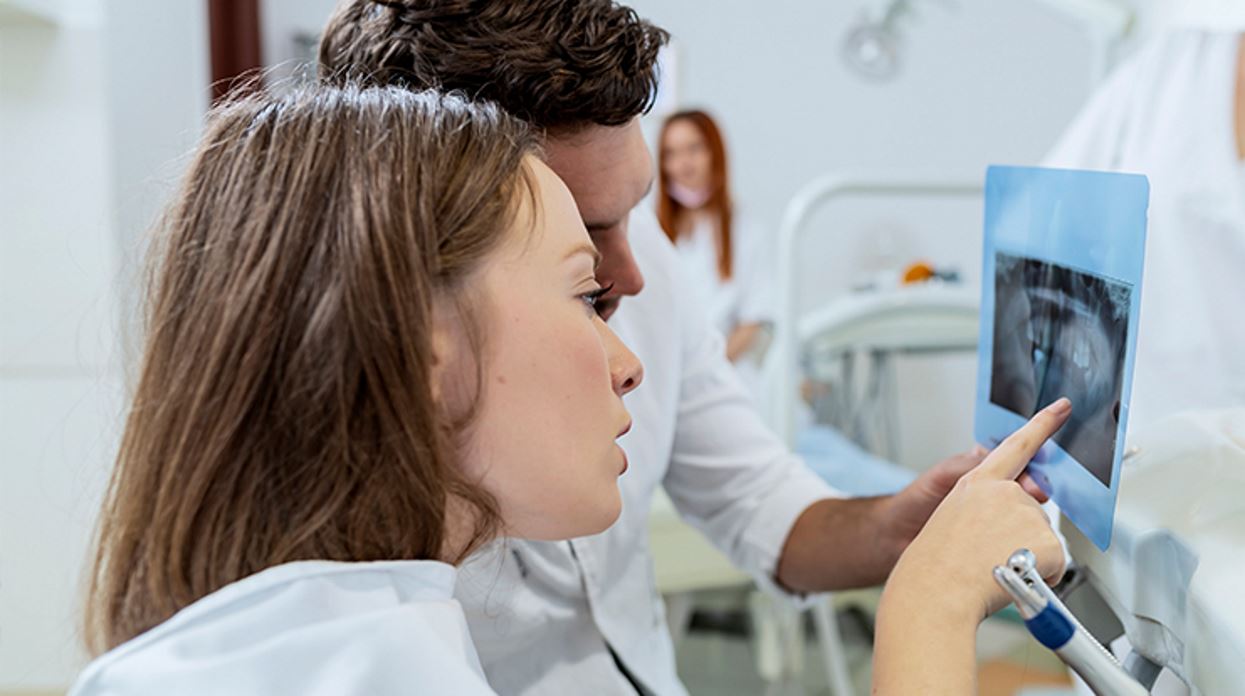
Multi-Institutional Organization for Greater Interprofessional Cooperation

A recent talk hosted by a multi-institutional collaboration challenged the idea of providers "staying in their lane" and promoted interprofessional cooperation.
Experts of all varieties are frequently told to “stay in their lane”—which makes sense, up to a point. You wouldn’t ask an astrophysicist to deal with your termite problems. But what happens when healthcare professionals are restricted to rigid “lanes” of practice, without the time or leeway to guide their patients towards greater holistic health? This conundrum was the focus of a recent talk sponsored by the Center for Integration of Primary Care and Oral Health (CIPCOH), a multi-institutional collaboration among Harvard School of Dental Medicine, UMass Medical School, Harvard Medical School, and MCPHS University.
Hosted and moderated by Tien Jiang, DMD, MEd, Co-Investigator at CIPCOH and Instructor at the Harvard School of Dental Medicine, “Stepping out of our ‘lanes’ & reimagining interprofessional education” was the first of a four-part series of panel discussions focusing on the future of interprofessional education, and included contributions from Candice Chen, MD, MPH, Chair of the Beyond Flexner Alliance Board of Directors and Associate Professor at the Milken Institute School of Public Health at George Washington University; Cherae Farmer-Dixon, DDS, MSPH, Dean and Professor at the Meharry Medical College School of Dentistry; and Stephen Persell, MD, MPH, Associate Professor of Medicine and Director of the Center for Primary Care Innovation within the Institute for Public Health and Medicine at the Feinberg School of Medicine, Northwestern University and Medical Director of Quality within Northwestern Medical Group.
Dr. Persell weighed in first, pointing out that “Our goal is not just to cure disease but to improve health, which requires a nuanced understanding of what contributes to health, including social determinants.” Furthermore, he pointed out, it is impossible to truly understand a patient’s circumstances unless we also understand issues of finances; transportation; and access to specialized types of care. “If you don’t understand determinants of health on all those levels,” said Percell, “You’re not prepared to move forward as a leader in health professions.”
Dr. Farmer-Dixon agreed, adding that “You can prescribe a drug, but if your patient cannot afford it, or does not believe it will help them, you haven’t treated that patient. So we have to be willing to step out of our lane, and out of the traditional educational model which kept us in silos and did not put us in collaboration with other professions.” She noted that her own dental training had not offered opportunities to collaborate with physicians, robbing both groups of the opportunity to learn more about overall systemic health.
Adding to the consensus on the need for change, Dr. Chen posited that “This ‘keep your head down, stay in your lane’ perspective is harmful to both our students and our healthcare providers.” Citing the recent example of a young, uninsured Bostonian patient who died of meningitis originating in an untreated tooth abscess, she added that, “If you watch patients die, it’s only so long before you have to raise your head, look around, and ask why this is happening. Keeping your head down in that system leads to moral injury and burnout. We must ask how we engage in this, what is our responsibility, and look carefully at that system.”
The discussion then expanded to cover the concept of “scope of care”, which defines—and separates—the health professions. Dr. Persell shared his perspective, noting that “When we look at patient-centered care, a narrow fee-for-service structure is really a disservice. We need to evolve this so that you can inquire about social needs, diagnose the underlying disorder, etc.” However, as Dr. Jiang pointed out, time is also one of the key barriers to this type of interprofessional exploration. “It takes a lot of resources to do IPE, and it’s logistically challenging. What are you doing at the clinical level to address those barriers?”
For Dr. Farmer-Dixon, the pandemic has afforded an unexpected opportunity to enhance interprofessional cooperation and care in Nashville, where the city has contracted with Meharry Medical College to provide COVID-19 testing services. Those services have been set up in trusted community venues such as churches, where they are staffed by a wide variety of healthcare providers and lead by dentists. (Farmer-Dixon is leading logistics for the operation.)
“The operations that we have are an example of interprofessional collaboration at its best,” she noted. “The team on each site is interprofessional; we have dentists, nurses, medical and dental and social work and public health students.” For the students, the testing sites have acted as a microcosm of the overall public health picture. “It’s a teaching opportunity, so they can understand the population they are serving while they are looking for symptoms and characteristics,” said Farmer-Dixon.
More University News
AI in Healthcare: MCPHS Leads the Conversation on Innovation
A new speaker series explores practical applications of artificial intelligence to shape the future of healthcare and healthcare education.
‘We Want to Build a Blueprint’: MCPHS Professor is on a Mission to Make Fitness Accessible
Christopher Joyce’s research is developing innovative ways to make strength training accessible for people with cerebral palsy, Down syndrome, and autism.
MCPHS 2024: The Year in Photos
Celebrate the moments that defined our year with a look back at the faces, events, and achievements that brought our Community together.
‘We Celebrate You’: Graduates Look to the Future at MCPHS Winter Commencement
More than 300 graduates gathered at the DCU Center to honor their achievements and embrace the next steps in their healthcare journeys.

